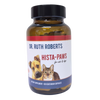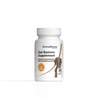Cats, like all animals, can experience stress. While a little stress can be helpful in dangerous situations, too much can be harmful. Long-term stress can weaken the immune system and lead to behavior issues or illness in cats.
Cats often become stressed when their environment is unpredictable. It's important to recognize stress early on in order to manage it effectively. Their diet plays a role in reducing stress. In this article, we will discuss how specific foods can help keep your cat calm and healthy.
Cat Stress Symptoms: How to Identify Anxiety in Your Cat
Cats can be masters at hiding their emotions, but there are clear signs that indicate your cat might be feeling stressed or anxious.
1. Changes in Behavior
A sudden change in a cat's behavior can be an early sign of stress. Signs may include sleeping more, crouching, reduced play, and less interaction. Stress can also cause changes in eating habits, disrupted sleep, over-grooming, and accidents outside the litter box. Common causes include moving to a new home, changes in routine, poor placement of litter trays or food bowls, new people or pets, and bullying by other cats.
2. Anxious Cat Body Language
Signs of anxiety in cats can often be identified by observing their body language and facial expressions. Attention to these cues can help you recognize when your cat is anxious.
- Tail position: A puffed-up or tucked tail signals fear or anxiety.
- Ears: Flattened or backwards-swiveling ears indicate discomfort.
- Eyes: Wide, dilated pupils indicate fear, while frequent blinking or avoiding eye contact suggests anxiety.
- Body posture: Crouching low or arching the back can indicate stress.
How to Calm an Anxious Cat Naturally
Calming an anxious cat doesn't always require medication. There are natural methods to reduce your cat's stress and create a more relaxed environment. Focusing on their physical space, daily routine, and overall well-being can make a big difference in their anxiety levels. To help your cat feel more secure, try these steps:
a. Create a Safe Space
To help cats reduce stress, provide a safe area where they can retreat, away from other animals or unfamiliar people. This space should have all the cat’s essentials—food, water, a litter tray, and comfortable resting areas.
b. Make Mealtime Fun
Cats naturally look for food, but indoor cats don't get to do this. Make a game out of feeding time by using puzzle feeders and hiding food in different places. This can help indoor cats stay mentally active and satisfy their natural instincts. It's especially helpful for indoor cats to prevent boredom and frustration.
c. Rotate Toys to Keep Interest
To keep indoor cats engaged and active, it's important to change their toys regularly. Cats can get bored if they always have the same toys. Toys that imitate small, moving prey are particularly good because they imitate a hunting experience. Changing toys often can stop boredom and encourage the cat to stay active.
d. Provide Vertical Spaces
Cats like to explore and find high spots to sit. Giving cats hiding spots or high areas can make them less stressed. These raised spaces also let cats see their surroundings from a safe spot, so they feel more in control. So, adding cat trees platforms can make them happy and help them feel safe.
e. Keep Food, Rest, and Litter Separate
When organizing a cat's space, make sure to keep the litter tray, resting area, and feed bowl separate. This helps reduce stress and encourages healthy habits.
f. Provide Scratching Posts
Cats naturally need to scratch. Scratching helps them mark territory, keep their claws healthy, and reduce stress. It also helps prevent damage to furniture and household items.
How Cat Food Can Help Manage Feline Stress
The cat's food can significantly affect how stressed or relaxed it feels. A proper diet can help reduce anxiety, increase calmness, and support your cat's healthier, more balanced life. Remember these essential dietary factors when managing stress in your cat's life.
1. Gallic Acid (G.A.)
Gallic acid (G.A.) is a potent antioxidant that can help improve gut health and support the immune system by fighting harmful free radicals. It also helps produce short-chain fatty acids (S.C.F.A.s), which affect the nervous system and may help reduce stress in cats. Research on its specific impact on cats is still ongoing.
Food Sources: Some fruits and vegetables, like blueberries, strawberries, and apples, contain gallic acid, an antioxidant. For cats, it's best to give them small amounts of blueberries or apple slices without seeds or skin as an occasional treat. Always introduce new foods slowly to avoid digestive issues.
2. Vitamins C and E
Vitamins C and E are essential antioxidants for cats. They help reduce oxidative damage caused by stress or illness. Vitamin E dissolves in fat, protects fats from damage, and prevents cell harm by free radicals. Both vitamins play vital roles in reducing the risk of chronic diseases caused by oxidative stress, helping cats manage stress and stay healthy.
Food Sources:
- Vitamin C: Cats naturally make vitamin C, but a little broccoli or spinach can help.
- Vitamin E: It's in animal-based foods like fish, liver, and egg yolks, which are safe for cats in moderate amounts. A bit of sunflower or olive oil can also give cats vitamin E. Foods with fish or liver usually have enough vitamin E for cats.
3. L-Tryptophan and Theanine
L-tryptophan is an amino acid that helps regulate mood and anxiety by serving as a building block for serotonin, a neurotransmitter in the brain, including L-tryptophan in a diet cat food to manage anxiety by stimulating serotonin production. Theanine, another amino acid found in green tea, interacts with brain receptors, helping to reduce stress and heart rate, which may benefit anxious cats.
Food Sources:
- L-Tryptophan: Found in animal-based proteins such as turkey, chicken, and eggs, which are safe for cats in moderation. Cooked, unseasoned lean turkey or chicken is an excellent way to include L-tryptophan in a cat's diet.
- Theanine: While green tea contains theanine, it is not recommended for cats due to its caffeine content. Instead, theanine supplements designed specifically for cats are a safer option for stress management.
4. GABA and Alphacasozepine
GABA (gamma-aminobutyric acid) reduces anxiety by slowing down neural activity, which has a calming effect. Supplements like alphacasozepine target GABA receptors and have effectively calmed anxious cats. These supplements may also help with behavioral issues related to stress and cognitive decline.
Food Sources:
- GABA: You won't find GABA directly in cat foods; you can support GABA production by adding fermented foods like plain, unsweetened yogurt or kefir to a cat's diet. These foods help improve gut health and indirectly aid GABA production. Always choose lactose-free or lactose-reduced versions to avoid digestive problems in cats.
- Alphacasozepine: You can give your cat alphacasozepine by feeding them lactose-free dairy products or using calming supplements designed for pets. This combination is naturally produced from milk protein.
5. Probiotics and Prebiotics
Gut health is connected to stress regulation in cats. Stress can throw off the balance of good bacteria in the gut, causing digestive problems and more stress. Probiotics restore helpful bacteria, while prebiotics feed these bacteria, promoting a healthy gut that reduces inflammation and produces S.C.F.A.s. These substances can affect brain function, regulate stress hormones, and improve mental health in cats.
Food Sources:
- Probiotics: Remember to include plain, unsweetened yogurt or kefir in small amounts for probiotics, which can help with gut health. You can also find probiotic supplements specially made for cats, which help keep their gut flora healthy.
- Prebiotics: Certain foods like pumpkin, carrots, and small amounts of apples (without skin or seeds) contain fibers that act as prebiotics. Pumpkin puree is often recommended for cats to help with digestion and balance gut bacteria.
Conclusion
To help your cat manage stress, it's important to recognize signs of anxiety and create a peaceful environment. Providing a stable routine, a comfortable space, and a balanced diet of cat food with stress-reducing nutrients like L-tryptophan and probiotics can help keep your cat calm and healthy.
Long-term stress can harm your cat's health, so ensuring it feels relaxed and lives a happier life is essential. For pet parents seeking a comprehensive approach to cat nutrition, The Original Crockpet Diet offers the tools you need to give your cat a happier, healthier life
















